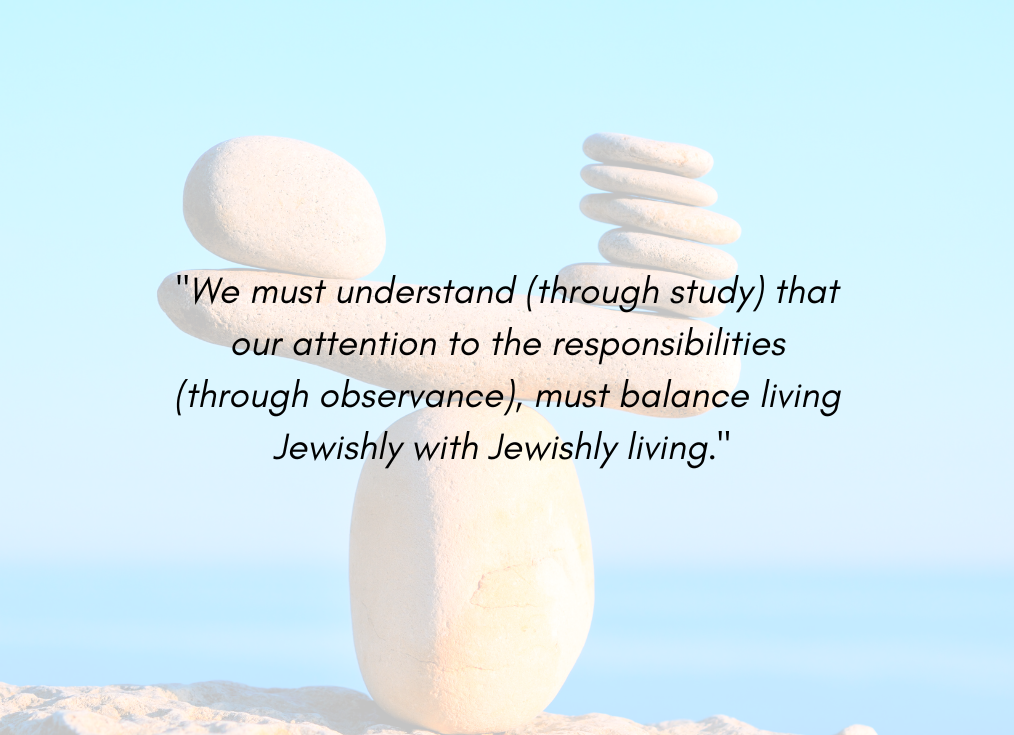Kavanah and Kevah

August 12, 2022
One of the great 20th Century rabbis, Abraham Joshua Heschel z”l, described prayer as a combination of kavanah (intent) and kevah (structure). Rabbi Heschel explained that the spontaneity of the heart, the meaning we gain from prayer through our kavanah, must be balanced with the fixity of the prayer book from where we gain our kevah.
Spontaneity and fixity. Intent and structure. Subjectivity and objectivity. These seemingly opposite terms in collaboration with each other provide a balance to help ensure that we do not fall victim, if one were to outweigh the other, to an extreme and unhealthy polarity.
In this week’s Torah portion, Va’etchanan, Moses tells the people to, “Study [the Commandments] and observe them faithfully!” (Deuteronomy 5:1). Study and observe. Kavanah and kevah.
If we were to go through life only studying the commandments the potential benefits would never come to fruition. Judaism would remain theoretical and lose its opportunity to help repair the world. Similarly, if we were to only observe the commandments without understanding why it was necessary to fulfill them, we would never be able to transfer the lessons learned through our actions to all aspects of our daily lives. How could we otherwise fulfill the responsibility to be a light unto the nations?
The world was created in balance. Light and dark. Day and night. Wet and dry. Since the birth of humanity, the ratio of male to female humans has maintained an almost consistent 50:50 balance. Even the Ten Commandments that are reiterated in this week’s Torah portion are given to Moses by Gd on two tablets. The first tablet with commandments one through five addresses the people’s relationship with Gd, and the second tablet with commandments six through ten focuses on the people’s relationship with one another.
To be a good Jew is to be a “well-balanced” Jew. We must understand (through study) that our attention to the responsibilities (through observance), must balance living Jewishly with Jewishly living. Living Jewishly is accomplished through a life of ritual practice, holiday observance, pride in one’s Judaism, and comfort in the public display of one’s heritage, culture, and faith. In other words, fulfilling the intentions of the first tablet’s commandments. Conversely, Jewishly living is incorporating Jewish moral and ethical values into our daily lives through actions that support tikkun olam (repairing the world), gemilut chasidim (caring for those in need), bikkur cholim (visiting the sick), and all the other people to people menschy behaviors. Balance is key!
In a few weeks, we will begin the month of Elul, the final month of 5782, which will lead into Rosh Hashanah and the celebration of the Jewish new year 5783. Elul is considered the month for reflection. It is a time to wake up the soul, hence the daily blowing of the shofar, and prepare ourselves for the sanctity of the high holy days. It is also a time to seek forgiveness for our mistakes and to bring together our kavanah and kevah, our meaning and practice, and repair any errs we might have committed over the year.
Living Jewishly by recognizing each day of the month of Elul, and Jewishly living by asking forgiveness from those whom we have wronged, will recalibrate our scales just in time for the Rosh Hashanah and Yom Kippur holidays.
Next month, the print copy of the 5783 Rosh Hashanah Jewish Journal will be arriving in community members’ mailboxes. If you have not received prior print copies and want to make sure you receive this and future copies please complete the online form. Additionally, if you know of anyone in the Jewish community who is alone, disconnected, or experiencing tough times, please reach out to us so we can do whatever we can for those in need. In the words of Hillel, “If not now when?” Because we are…
STRONGER TOGETHER.
Shabbat shalom,

